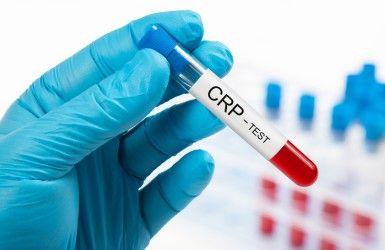General Health
Experiencing Stomach Pain Or Fatigue After Eating? Get This Test Done
6 min read
By Apollo 24|7, Published on - 26 May 2025
Share this article
0
0 like

If you often feel tired or uncomfortable after meals, you’re not alone. While occasional bloating or drowsiness after eating is normal, persistent stomach pain or fatigue after meals could signal an underlying health issue, possibly related to your liver. One test that doctors commonly use to investigate these symptoms is the ALT (Alanine Aminotransferase) blood test.
The ALT blood test is a simple but powerful diagnostic tool that can provide early clues about liver health. In this article, we’ll explore how this test works, why it’s recommended, and how it can help uncover the reason behind your digestive symptoms and fatigue.
What Is an ALT Blood Test and Why Is It Important?
An ALT (Alanine Aminotransferase) blood test, also known as the SGPT test (Serum Glutamic-Pyruvic Transaminase test), measures the level of ALT enzyme in the blood. ALT is primarily found in liver cells and plays a key role in breaking down proteins for energy. Normally, ALT levels stay within a healthy range, but when the liver is damaged, inflamed, or stressed, ALT leaks into the blood, causing elevated levels.
Doctors use this test to evaluate liver function, detect early signs of liver disease, and monitor ongoing liver conditions. High ALT levels can indicate problems like fatty liver disease, hepatitis, alcohol-related liver damage, or medication effects. If you're experiencing fatigue, nausea, or digestive discomfort, your doctor may recommend an ALT blood test to check your liver health and guide further treatment.
How Liver Function Impacts Digestion and Energy Levels
Your liver is essential to how your body processes food and stores energy. It helps:
- Break down nutrients after you eat.
- Produce bile, which aids digestion, especially of fats.
- Filter toxins from the blood.
- Store glucose (sugar) and release it when your body needs energy.
If the liver isn’t working properly, these processes are disrupted. That’s why liver problems can make you feel both bloated after eating and constantly tired. A compromised liver might not convert nutrients efficiently or store energy correctly, which explains these symptoms.
Have more questions?
Key Conditions Linked to Elevated ALT Levels
High ALT levels may suggest liver cell damage due to a variety of causes, including:
- Nonalcoholic Fatty Liver Disease (NAFLD): Fat buildup in the liver, often linked to obesity, diabetes, or high cholesterol.
- Hepatitis (A, B, or C): Viral infections that cause inflammation and damage to the liver.
- Alcoholic Liver Disease: Long-term alcohol use can lead to liver inflammation and damage.
- Cirrhosis: Scarring of liver tissue from chronic liver damage.
- Drug-Induced Liver Injury: Certain medications, including over-the-counter pain relievers like acetaminophen, can affect liver function.
Understanding the cause of elevated ALT is key to guiding appropriate treatment and lifestyle changes.
When to Consider Getting an ALT Test?
You might benefit from an ALT blood test if:
- You often feel tired or weak after eating, without an obvious cause
- You experience frequent bloating, nausea, or stomach pain after meals
- You have known risk factors for liver disease, such as obesity, diabetes, or regular alcohol use
- You have a family history of liver conditions or related health issues
- Your doctor is monitoring your liver health due to medications or an existing medical condition
The ALT blood test is commonly included in a broader liver function test (LFT) panel, helping doctors evaluate your overall liver health and identify potential concerns.
How to Prepare for an ALT Blood Test
Preparing for an ALT blood test is simple, but following a few guidelines can help ensure accurate results. Here’s what you need to know:
- Fasting Requirements: In most cases, fasting is not required for an ALT test. However, if your doctor orders additional tests alongside ALT, such as a complete liver function panel, you may need to fast for 8 to 12 hours before the test.
- Medication Considerations: Certain medications, including pain relievers, cholesterol-lowering drugs, and herbal supplements, can affect ALT levels. Inform your doctor about any medications or supplements you are taking. They may advise adjustments before the test.
- Avoid Alcohol: Alcohol can impact liver enzyme levels, so it is recommended to avoid alcohol for at least 24 hours before the test.
- Stay Hydrated: Drinking plenty of water before the test can make the blood draw easier and help maintain normal enzyme levels.
What to Expect During the ALT Test Procedure?
The ALT blood test is a routine procedure that involves a simple blood draw and usually takes only a few minutes. Here’s what typically happens:
- The area is cleaned with antiseptic to prevent infection.
- A tourniquet is applied to make the vein more visible.
- A small needle is used to collect blood into a vial.
- You may feel a quick sting or mild discomfort.
- After collection, the needle is removed, and a bandage is applied.
- The sample is sent to a lab for analysis.
The procedure takes just a few minutes, with no downtime needed.
Interpreting Your ALT Test Results
ALT levels are measured in units per litre (U/L) of blood, and normal ranges can vary slightly depending on the laboratory and testing methods. Generally, the following classifications apply:
- Normal ALT Levels: Typically range from 7 to 56 U/L, indicating healthy liver function.
- Mildly Elevated ALT: Levels between 57 and 120 U/L may suggest fatty liver disease, mild liver inflammation, or medication effects.
- Significantly Elevated ALT: Levels above 120 U/L could indicate more serious liver conditions, such as hepatitis, cirrhosis, or liver injury.
Note: ALT levels alone do not provide a complete diagnosis. Your doctor will interpret your results in the context of your symptoms, medical history, and additional liver function tests to determine the underlying cause and appropriate next steps.
Managing Elevated ALT Levels and Additional Liver Function Tests
If your ALT levels are higher than normal, your doctor will determine the cause and recommend ways to improve liver health. The approach may include:
- Lifestyle modifications: Adopting healthier habits is often the first step. This includes maintaining a healthy weight, reducing or eliminating alcohol consumption, following a balanced, liver-friendly diet, and managing underlying conditions like diabetes or high cholesterol.
- Medication review: Some medications can impact liver enzymes. Your healthcare provider may adjust or change prescriptions if they’re found to be contributing to elevated ALT levels.
- Ongoing monitoring: Routine blood tests will help track your liver enzyme levels over time and evaluate how well any interventions are working.
- Targeted treatment: If a specific liver condition is diagnosed, such as viral hepatitis or non-alcoholic fatty liver disease, your doctor may recommend medical treatments, referrals to a specialist, or more advanced interventions.
Conclusion
Persistent stomach pain or fatigue after eating may signal an underlying liver issue. The ALT blood test is a simple and effective way to check liver health and detect problems early. Identifying the cause allows for timely interventions, whether through lifestyle changes, medical treatment, or further testing. If these symptoms persist, consulting a doctor and considering an ALT test could be a crucial step toward improving your health and well-being.
General Health
Frequently Asked Questions
What does it mean if my ALT blood test high?
What does it mean if my ALT blood test high?
Is the SGPT test the same as an ALT test?
Is the SGPT test the same as an ALT test?
What symptoms might indicate the need for an ALT blood test?
What symptoms might indicate the need for an ALT blood test?
How often should liver function tests be done?
How often should liver function tests be done?
Can medications affect ALT levels?
Can medications affect ALT levels?
Leave Comment
Recommended for you

General Health
Chills Without Fever: What Causes Them and What to Do?
Chills usually occur with fever, but in some cases, they come without fever. So what do they mean then and what to do next? To know, read this blog.

General Health
Top 10 Yoga Asanas for Managing Heart Blockages
Heart blockages can lead to serious complications like stroke and heart attack. Taking steps to address the condition is essential. Explore the significance of yoga in addressing heart blockage and improving cardiovascular well-being. Discover the top poses for boosting heart health by reducing stress, enhancing blood circulation, and strengthening the heart muscles.
.jpg?tr=q-80)
General Health
RDW Test – Normal Range, Purpose, Procedure, And Results Interpretation
Learn about the RDW test, including its normal range, purpose, procedure, and how to interpret results. Understand how this test helps assess red blood cell distribution and overall health.
Subscribe
Sign up for our free Health Library Daily Newsletter
Get doctor-approved health tips, news, and more.
Visual Stories

The Best Exercises for Controlling Blood Sugar Levels
Tap to continue exploring
Recommended for you

General Health
Chills Without Fever: What Causes Them and What to Do?
Chills usually occur with fever, but in some cases, they come without fever. So what do they mean then and what to do next? To know, read this blog.

General Health
Top 10 Yoga Asanas for Managing Heart Blockages
Heart blockages can lead to serious complications like stroke and heart attack. Taking steps to address the condition is essential. Explore the significance of yoga in addressing heart blockage and improving cardiovascular well-being. Discover the top poses for boosting heart health by reducing stress, enhancing blood circulation, and strengthening the heart muscles.
.jpg?tr=q-80)
General Health
RDW Test – Normal Range, Purpose, Procedure, And Results Interpretation
Learn about the RDW test, including its normal range, purpose, procedure, and how to interpret results. Understand how this test helps assess red blood cell distribution and overall health.